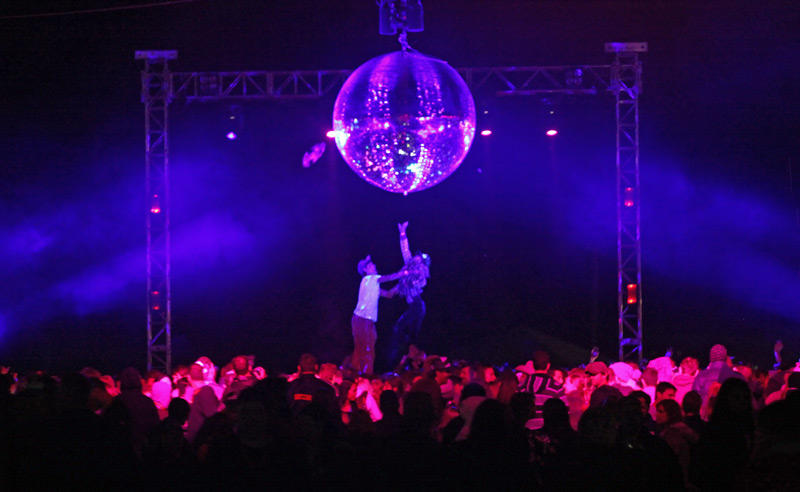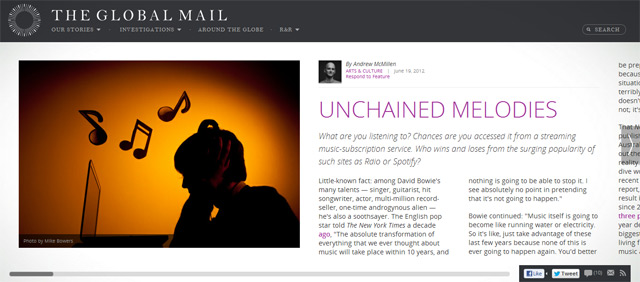Wired story: ‘Daft Punk’s album premiere in Wee Waa, Australia’, May 2013
A story for Wired.com – my first contribution to the website. Excerpt below.
We Went to the Daft Punk Album Premiere in Wee Waa, Australia, Pop. 2,100
by Andrew McMillen / Photographs by Rachael HallWEE WAA, Australia – The world premiere of the latest Daft Punk album, Random Access Memories, was originally scheduled to take place on May 17 at a farm show in the rural Australian town of Wee Waa, population 2,100. The unconventional choice of locale made worldwide news, as intended. The event (and its marketing) was always about more than just two French guys releasing an album: It was an attempt to breathe life into the idea that a distinct collection of songs could still be relevant in 2013, when digitally downloaded singles dominate and launch dates have become almost meaningless.
Imagine Sony’s frustration, then, when Random Access Memories trickled onto the internet on May 14, three days ahead of the intended world premiere in Wee Waa, and Daft Punk hastily started streaming the album on iTunes to tide over listeners till the actual release date. The impact on the planned celebration was immediate. A journalist from the local newspaper The Narrabri Courier told Wired that the Wee Waa Motel experienced 37 out of 60 cancellations in the day following the leak. What had been sold as a world premiere now seemed humdrum, an experience that anyone with an internet connection, BitTorrent or iTunes could have.
To many music fans, Tuesday’s news was an inevitability, and surprising only in its lateness: most big releases appear online weeks, or even months ahead of their true street date. So what value, if any, does an album release event have after once an internet leak has removed the mystery? I went to Wee Waa to find out.
When I wake up on the morning of 79th Annual Wee Waa Show, I add Random Access Memories to my to collection on the streaming music service Rdio, a process that takes only minutes. During the seven-hour drive to Wee Waa, the temptation to listen to the album is powerful. After all, it’s right there. I resist, though, out of respect for the album and the experience ahead. I figure that saving that crucial first listen for the first night will be worth it.
Situated 560 kilometers (347 miles) north-west of Sydney, Australia’s most populated city, Wee Waa was previously known for its cotton production, and little else. The choice to host the album launch here had everything to do with sheer disorientation — hence the global headlines. Sony first floated the idea with the Narrabri Shire Council in February, two months before the news was made public in mid-April. The Wee Waa Show committee discussed at length how the showgrounds would cope with the influx of tourists; local accommodation was fully booked soon after the news broke.
This three-day event is an important cultural staple of the region, even when Daft Punk isn’t around. The show format combines elements of agricultural presentations (cattle judging, pet shows) with competitions (horse-riding, cake-baking) and carnival rides familiar to attendees of American state fairs. It’s easy for city-dwelling outsiders to poke fun at these meets, but for local farming families, these regional shows provide a welcome respite in their routine. It’s a chance to put down tools for a couple of days, socialize with one another, and celebrate successes.
In the days before the main event, rumors of a last-minute appearance from the French duo still circulate, and Sony stokes the flames by refusing to rule out the possibility. On Friday, there’s talk of the local airport being temporarily closed for a couple of mysterious, high-security chartered flights. Perhaps Thomas Bangalter and Guy-Manuel de Homem-Christo had elected to make the trek after all, people say; perhaps their statements to the contrary were a smokescreen to deter all but the true believers, the fans who still thought an album launch meant something, leak or no leak.
For the full story, and more photographs, visit Wired.com.

